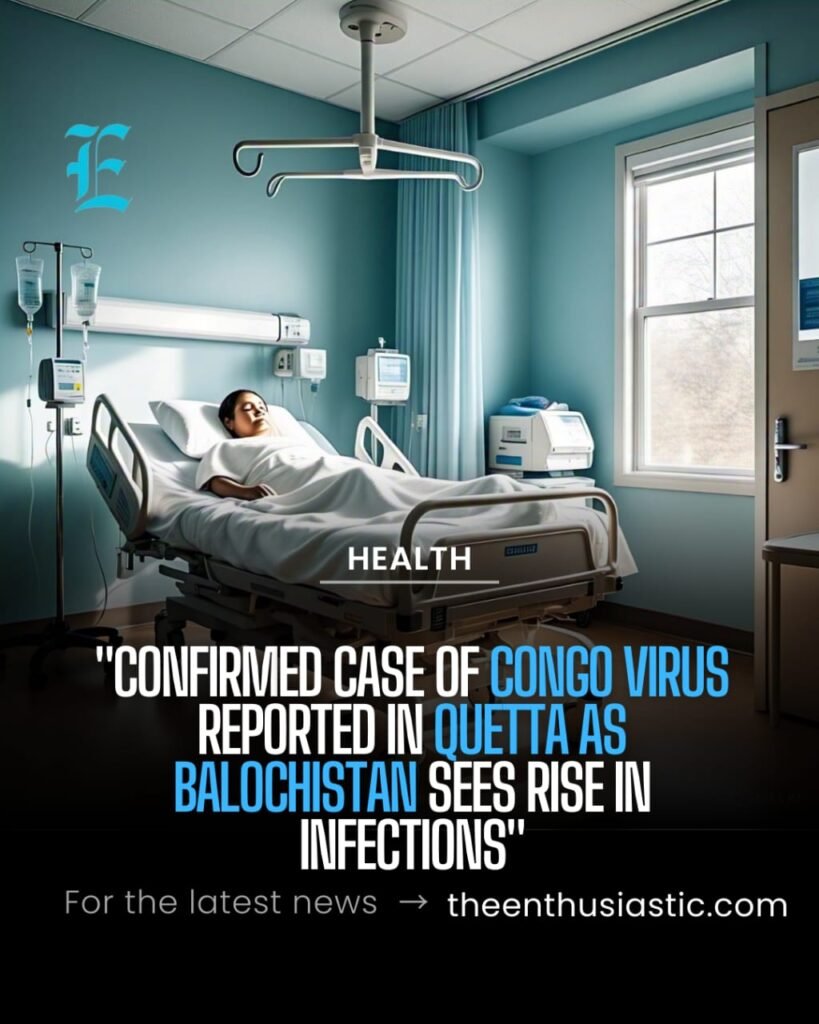Confirmed Case of Congo Virus Reported in Quetta as Balochistan Sees Rise in Infections

Table of Contents
Introduction
Quetta: A confirmed case of Crimean-Congo Hemorrhagic Fever (CCHF), commonly known as Congo virus, has been reported at Fatima Jinnah Hospital in Quetta, raising concerns about a potential outbreak in the region. The infected patient, a 25-year-old man from Chaman, has been admitted to the hospital’s isolation ward following laboratory confirmation of the virus.
This case marks the fourth confirmed instance of Congo virus in Balochistan so far this year. One patient has already died due to complications from the virus, according to health officials. The uptick in infections comes as the province grapples with high exposure risks due to its widespread livestock handling and trade, especially in rural and border areas.
Understanding the Congo Virus Threat
CCHF is a highly contagious viral disease with a significant mortality rate. It is transmitted primarily by Hyalomma ticks and through direct contact with infected animals or humans, particularly their blood, tissues, or bodily fluids.
People at greatest risk include:
Livestock handlers
Butchers and slaughterhouse workers
Healthcare professionals treating infected patients
Symptoms and Risks
The Congo virus typically begins with flu-like symptoms, such as:
Sudden high fever
Muscle aches
Dizziness
Headache
Fatigue
In severe cases, symptoms can rapidly escalate to:
Internal bleeding
Organ failure
Shock, and in some instances, death
Because of its rapid progression and high risk of transmission, early diagnosis and strict isolation protocols are essential to prevent further spread.
Health Authorities Respond
Medical staff at Fatima Jinnah Hospital have confirmed that the infected patient is receiving supportive care in a dedicated isolation ward. Meanwhile, provincial health officials are on high alert, stepping up surveillance, particularly in Chaman, Quetta, and surrounding rural districts.
Dr. Shama Ishaq, a senior infectious diseases specialist, warned, “People involved in animal rearing, slaughtering, and those traveling through tick-infested regions should exercise extreme caution. Personal protection and hygiene are the first line of defense.”
Prevention Measures Urged
Authorities are urging the public to adopt preventive measures, especially in high-risk occupations and areas. These include:
Wearing protective clothing while handling animals
Using tick repellents
Avoiding contact with animal blood and secretions
Ensuring proper sanitation in livestock markets and slaughterhouses
Promptly seeking medical attention for suspicious symptoms
Public Awareness Crucial
In light of these recent developments, health awareness campaigns are being intensified in collaboration with local administration and livestock departments. Leaflets and announcements are being distributed in Pashto, Balochi, and Urdu, aimed at educating communities about CCHF risks and precautions.
The Balochistan Health Department has also issued alerts to hospitals and clinics to be prepared for early detection, safe treatment, and reporting of suspected cases.
Conclusion
The confirmation of another Congo virus case in Quetta signals a growing health concern for Balochistan. With livestock and animal contact being central to daily life in many areas of the province, the risk of transmission remains high. Effective community engagement, healthcare preparedness, and personal vigilance are vital to prevent the further spread of this dangerous disease.
Health officials continue to monitor the situation and call for public cooperation to ensure the virus does not escalate into a wider outbreak.
FAQs
Q1: What is the Congo virus?
A: The Congo virus, or Crimean-Congo Hemorrhagic Fever (CCHF), is a severe viral illness spread through tick bites and contact with infected blood or body fluids.
Q2: How can someone protect themselves from CCHF?
A: Avoid contact with livestock blood and ticks, wear protective clothing, and maintain strict hygiene when handling animals.
Q3: Is Congo virus contagious from person to person?
A: Yes, especially through contact with the blood or bodily fluids of an infected person.
Q4: What should I do if I suspect someone has Congo virus?
A: Immediately contact local health authorities and ensure the person is isolated to prevent further transmission.
Q5: Is there a vaccine or treatment for the Congo virus?
A: There is no specific vaccine. Treatment focuses on supportive care, managing symptoms, and preventing complications.
Would you like this formatted for publication or turned into a news bulletin style as well?
